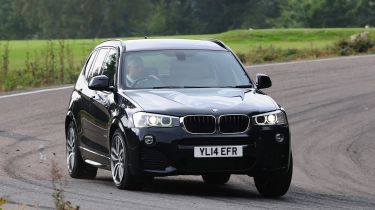Used BMW X3 (Mk2, 2010-2017) review - What’s it like to drive?
The BMW X3 Mk2 was one of the best-handling SUVs of its type at the time, although the ride was on the firm side
Even towards the tail-end of its lifecycle, the BMW X3 Mk2 was one of the most fun-to-drive family SUVs you could buy at the time. That poise did come at the expense of outright comfort, since the X3 Mk2 had a noticeably firm ride. The diesel-only engine range may be at odds to some with the BMW’s sporty handling, though they all have a decent turn of speed and the more powerful models in particular are pretty punchy.
Engines and performance
If you’d prefer petrol power, then the BMW X3 Mk2 won’t be the car for you, because the car was only ever available in the UK with diesel engines. Handily, there were a decent number of options on the X3 Mk2, ranging from an entry-level 2.0-litre unit to brawnier 3.0-litre engines.
When new, the starting point in the BMW X3 Mk2 range was the 18d model, which used a 2.0-litre four-cylinder engine that produced 148bhp. That isn’t a huge amount of power for a car of this size, and it shows when you work it hard when accelerating, though the decent mid-range oomph does go some way to offsetting that. The engine can sound a bit gruff, too, although this was improved on post-facelift models.
Used - available now

2024 Cupra
Formentor
22,664 milesAutomaticPetrol1.4L
Cash £22,387
2020 Toyota
GR Yaris
14,494 milesManualPetrol1.6L
Cash £30,563
2022 Fiat
500
8,538 milesManualPetrol1.0L
Cash £9,387
2022 Citroen
C4
32,555 milesManualPetrol1.2L
Cash £12,787If you need a bit more performance, the 20d version uses a slightly more potent 187bhp version of the same 2.0-litre engine. That extra grunt doesn’t transform the car into a power house, though it does make the car a bit more flexible in day-to-day driving. Unlike the rear-wheel drive 18d, the 20d is only available with all-wheel drive, and pre-facelift models were also more vocal than their post-facelift counterparts.
For drivers who need more performance than that or regularly do a bit of towing, the 3.0-litre six-cylinder diesels in the 30d and the 35d. They’re much more potent than the four-cylinder offerings (255bhp for the 30d; 308bhp for the 35d), and they’re smoother and more refined, too, so they’re nicer to drive on longer journeys. Of course, being larger and more powerful engines, the 3.0-litre options are noticeably more expensive to run than the 2.0-litre versions.
Two gearbox options were available on the BMW X3 Mk3 – a six-speed manual and an eight-speed automatic – though not all engines were available with both transmissions. 2.0-litre cars came as standard with the manual and could be specified optionally with the automatic instead, whereas the 3.0-litre engines were only ever offered with the automatic gearbox. Both gearbox choices are superb and suit the car well, so the choice over whether to go for a manual or automatic model will come down to availability and personal preference.
On the road
The previous-generation of BMW X3 was very good in the handling department, and that trait was carried over to the Mk2 model. With lots of grip, impressive body control when cornering and well-weighted steering, the BMW X3 Mk2 is very good fun to drive, especially when you consider this is a higher-riding vehicle than a conventional family car.
That handling poise has been brought about by a stiffer suspension setup, which does have the trade-off of meaning the X3 Mk2 didn’t set the class standard for ride quality. While not uncomfortable, the ride can feel quite firm at times (especially at lower speeds), so you’ll feel the bumps and potholes in the road. Cars with the optional adaptive damper system did have a more cosseting Comfort setting, but even this didn’t transform the BMW into a cushioning cruiser.
Likewise, the BMW X3 Mk2 is a fairly refined car, although you may want to look elsewhere if you’re after the quietest and most cosseting drive possible from a used premium SUV. There’s a bit of tyre noise when driving at higher speeds, and the large door mirrors do generate a noticeable amount of wind noise.
If you decide to take the plunge on a used BMW X3, there’s a very good chance the car will be all-wheel drive: other than the rear-wheel drive-only 18d diesel model, every other version of the X3 Mk2 was only available with all-wheel drive. In general day-to-day driving, you won’t notice the difference, though the extra traction can be handy for when you’re driving in slippery conditions or doing a bit of light off-roading.







